At some time prior to July 8, 2022, the City and County of San Francisco Sheriff’s Office decided to create a pilot program in County Jail #3 (“CJ3”) in housing unit 5. The San Francisco Sheriff’s Office had two employees evaluate the functionality of the program and identify any concerns they saw with the changes proposed by the Sheriff’s Office. These deputies found numerous safety concerns that made it difficult to perform the regular safety checks of the inmates in some cases and completely impossible in other cases.
Despite the safety concerns, on July 8, 2022, the changes were implemented.
CJ3 has multiple housing units that are the shape of a circle with inmate cells on the perimeter of the circle. This circle is divided into to sides, the A and B sides. Inmates from A cannot cross over to B and vice versa. On one side of the dividing line is a “Crow’s Nest” or a tower with windows that can look out over portions of both the A and B sides of the housing unit. This Crow’s Nest has previously not been used.
Prior to July 8, 2022, CJ 3 has always had 2 deputies working a general population housing unit. One each on the A and B sides. These deputies worked on the floor with the inmates.
Safety Checks are required to be done every hour. There are state laws, known as Title 15 rules, as well as a San Francisco Sheriff’s Office policy, CODM 4.04, which outline the minimum requirements for these safety checks. The purpose of the checks is to maintain safety and security in the jail for staff, visitors and the inmates. Some of the requirements of these checks include noting the skin color of the inmate, the rise and fall of the chest, movement that indicates life, looking for any signs of illness or distress, inspection of cell doors and windows and a search for any apparent contraband or hazards.
These safety checks were completed by the deputies working on the floor but walking up to each inmate cell door and observing the inmate, the cell and surrounding area. Sometimes, at night, a flashlight would be required to properly check the welfare of the inmates.
On July 8, 2022, this changed. No longer would there be any floor deputies. Now, only one deputy, instead of two, would monitor all the inmates by him/herself, from the Crow’s Nest. In the event of an emergency, the deputy in the Crow’s Nest was not to leave and assist an inmate having a medical emergency, being attacked, or attempting to harm himself, instead, the deputy is now required to call for help. Deputies who are roaming around the rest of the jail would then have to respond and handle the situation, wasting valuable time.
The San Francisco Sheriff’s Office was unable to remedy all the safety concerns raised by the two employees who evaluated the new Crow’s Nest plan. The San Francisco Sheriff’s Office administration directed Crow’s Nest deputies to utilize binoculars to assist them in seeing the inmates better. While this may help with viewing some of the inmates when the lights are on, they do little to help at night and cannot solve the problem of the inability to see some of the cells at all, with or without binoculars.
The DSA sent a letter to the San Francisco Sheriff’s Office on July 18, 2022 and it was resent to the Director of Employee Relations, on July 22, 2022. This letter demanded that the new Crow’s Nest practice stop until the parties can meet and confer over the impacts and effects of it. Numerous impacts and effects were listed in this notice.
The San Francisco Sheriff’s Office responded on July 26, 2022, refusing to maintain the status quo until the parties were able to meet and confer.
Within days of its implementation, a fight broke out in one of the cells in the evening and it was not discovered until the next morning. This is evidence of the lack of safety the DSA was concerned with when it demanded the San Francisco Sheriff’s Office cease and desist its new Crow’s Nest practice.
March 28, 2022 RFI.
On March 28, 2022, the DSA requested information necessary and relevant to ascertain the dates, times, and shifts that the San Francisco Sheriff’s Office fell below the minimum staffing required by the MOU. (Exhibit X) Arbitrator Alexander Cohen previously resolved a grievance filed by DSA when the San Francisco Sheriff’s Office previously violated the Minimum Staffing section of the MOU. Arbitrator Cohen issued his ruling in favor of the DSA in 2017 in favor of the DSA. In his decision, he awarded damages to be paid to those members who worked on shifts that were below the minimum staffing required by the MOU. Because the San Francisco Sheriff’s Office continued to fall below the minimum staffing, the DSA filed a new grievance on March 4, 2022. The RFI filed on March 28, 2022 was to gather necessary and relevant information to calculate the damages incurred by the DSA members as the result of the San Francisco Sheriff’s Office’s current grievance for again violating the MOU. (Lomba Decl. ¶ 9)
The March 28, 2022 RFI was acknowledged received by the City Attorney’s office and forwarded to the Employee Relations Division (ERD) to respond. No response from ERD was ever received. (Howell Decl. ¶ 6 and 9; Exhibit 3) On May 2, 2022, the DSA followed up with ERD and the City Attorney’s office and demanded production of the RFI by May 9, 2022, which never came. (Howell Decl. ¶ 10 and 11; Exhibit 5)
On May 13, 2022, the DSA filed a First Amended Unfair Labor Practice Charge in PERB Case No. SF-CE-1794-M to have this matter added to that current litigation. On June 7, 2022, after filing the amendment to the PERB Charge, the San Francisco Sheriff’s Office produced documents responsive to the March 28, 2022 RFI. Judge Cloughesy declined to amend the Charge and Complaint in that matter to include this RFI issue but gave leave to refile this matter with PERB.
February 16, 2022 RFI.
On February 16, 2022, the DSA requested information necessary and relevant to ascertain the names, dates, and hours of Overtime Pay DSA members were denied. Information was also requested to ascertain the history, deliberation, changes, analysis and communications regarding Administrative Code section 18.13 involving the maximum permissible overtime. This information is necessary for the DSA to enforce the contract at a grievance proceeding and is unable to establish the damages or the individual DSA members affected, without the response to the RFI.
The February 16, 2022 RFI was acknowledge received by the City Attorney’s Office on February 22, 2022, via email. (EXHIBIT XX – email from KNS to Rapoport and back) Having received no responsive documents, the DSA’s counsel sent an email on August 2, 2022 to demand production. (Exhibit XX – Email KNS to)
Contact:
Ken Lomba
SFDSA President
415-696-2428
San Francisco, CA
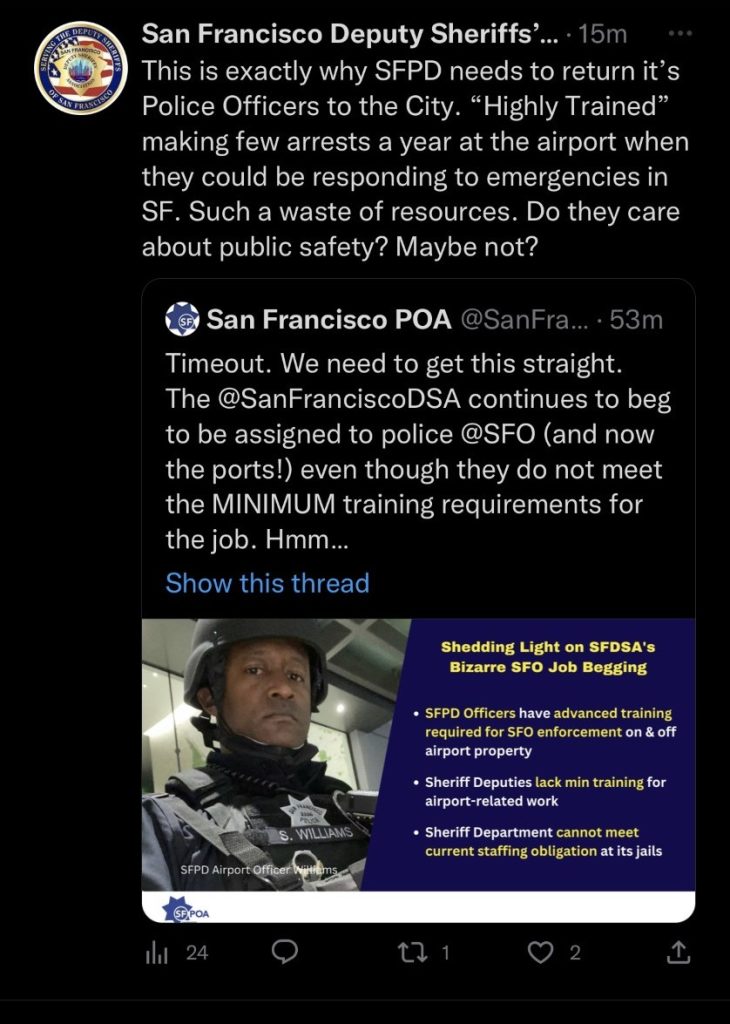

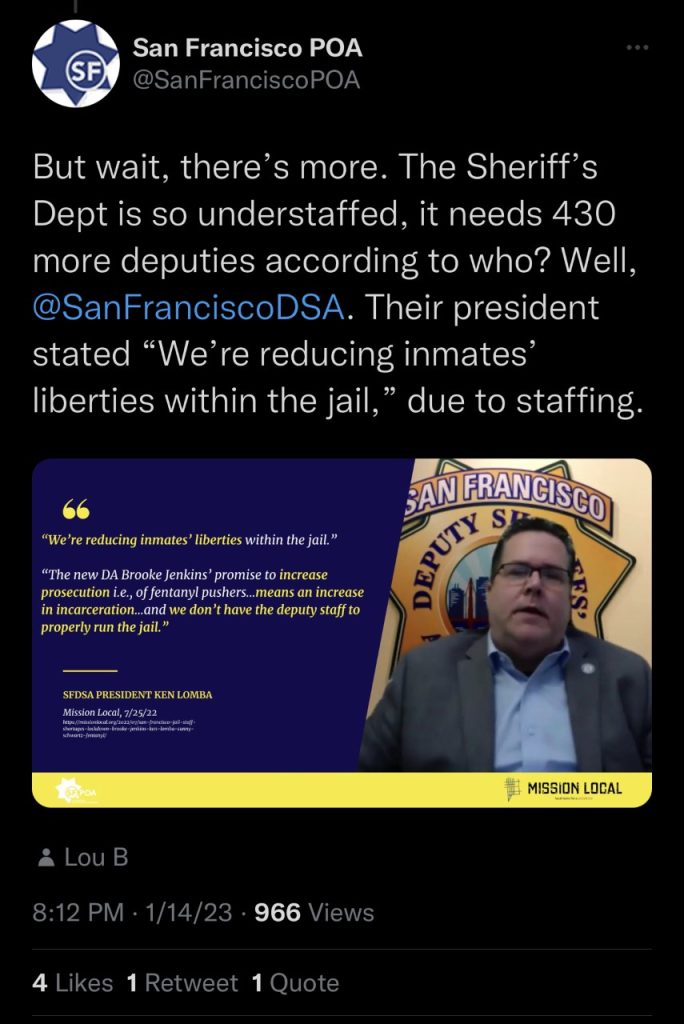
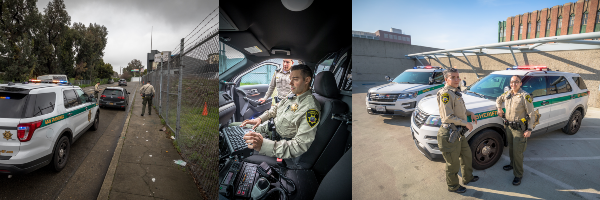
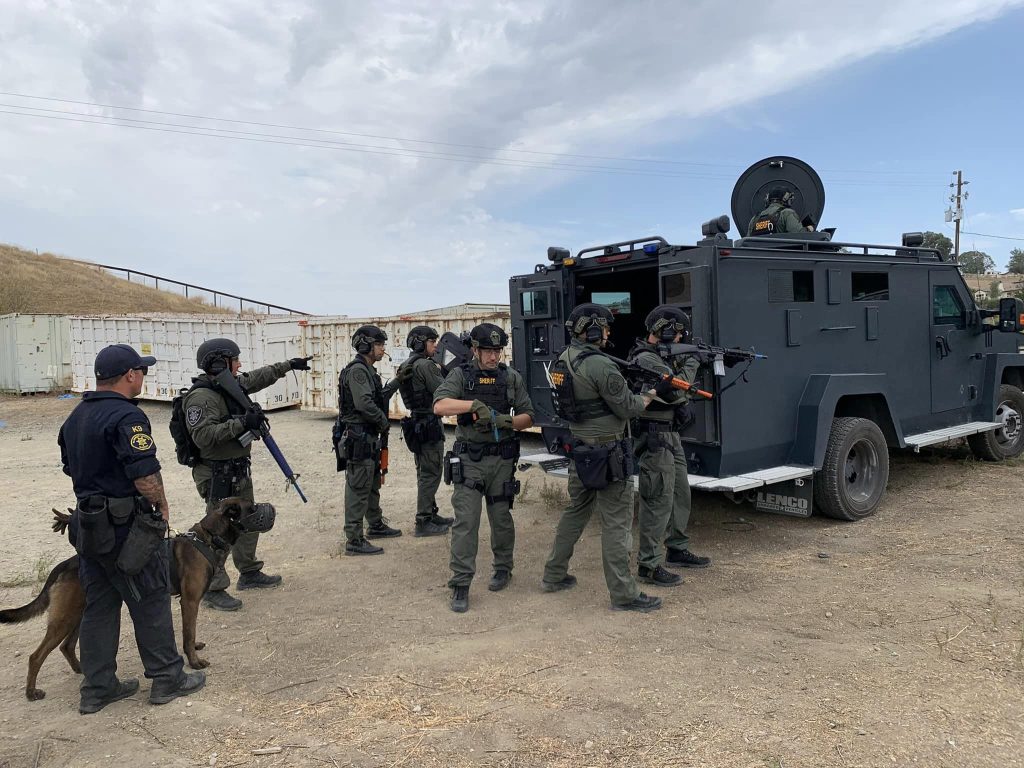
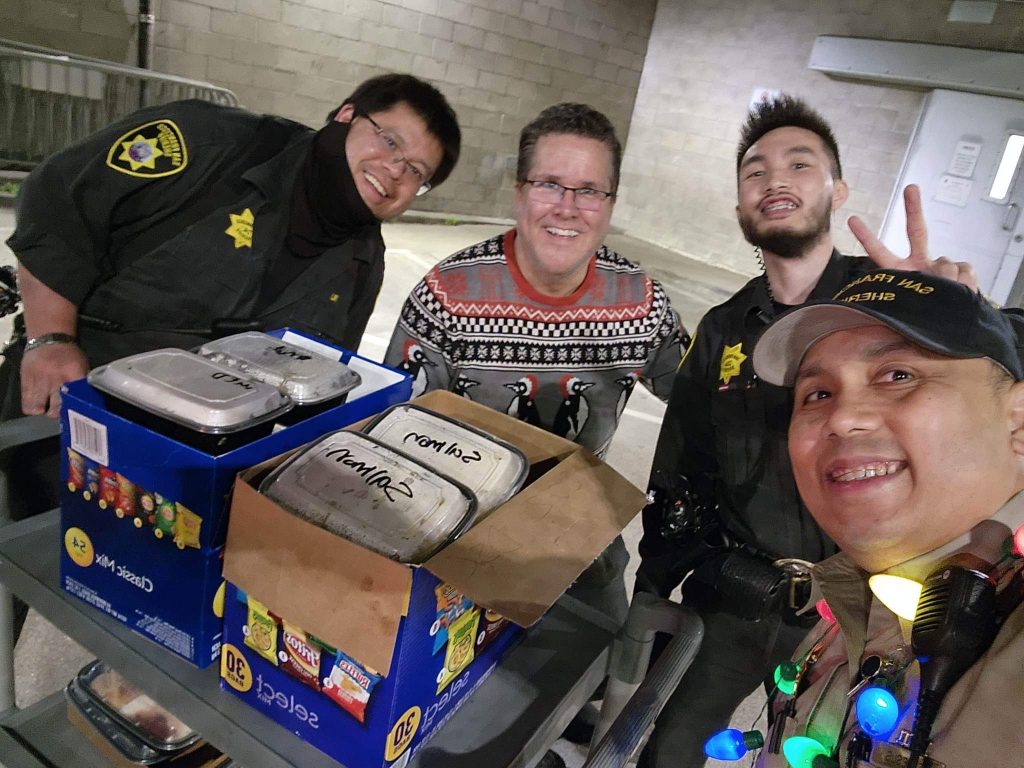
 In February 2021, the San Francisco Sheriff’s Office prepared their budget request, within that request they only asked for funding for 44 deputy sheriff positions. This number is extremely low with deputies retiring and leaving to other agencies as well as the existing approx. -203 full time employee vacancies.
In February 2021, the San Francisco Sheriff’s Office prepared their budget request, within that request they only asked for funding for 44 deputy sheriff positions. This number is extremely low with deputies retiring and leaving to other agencies as well as the existing approx. -203 full time employee vacancies.